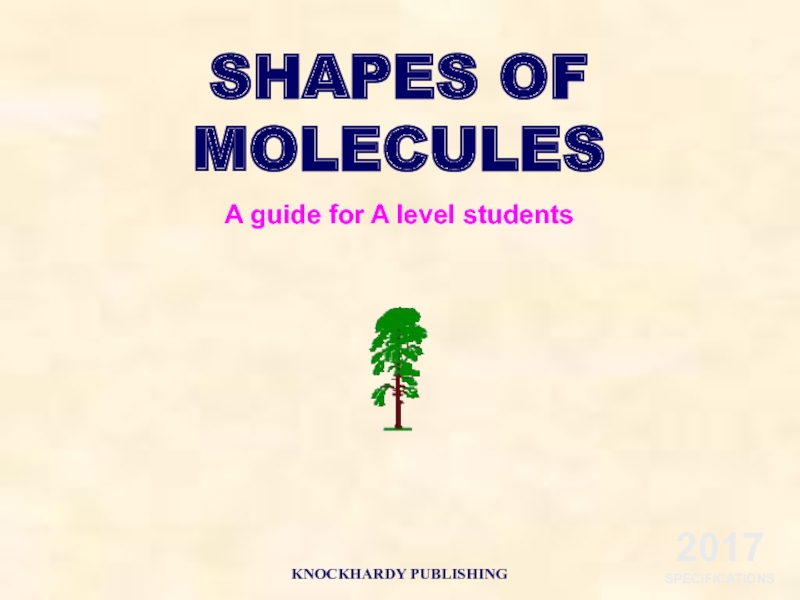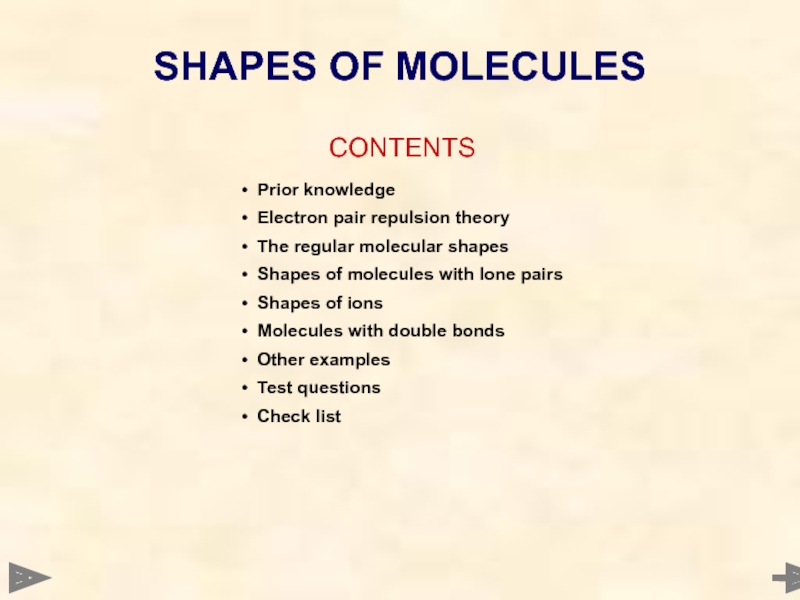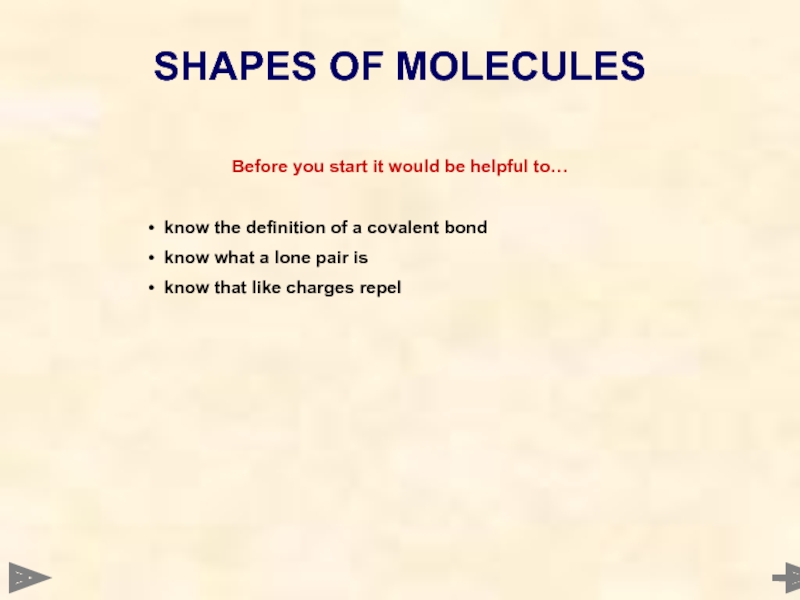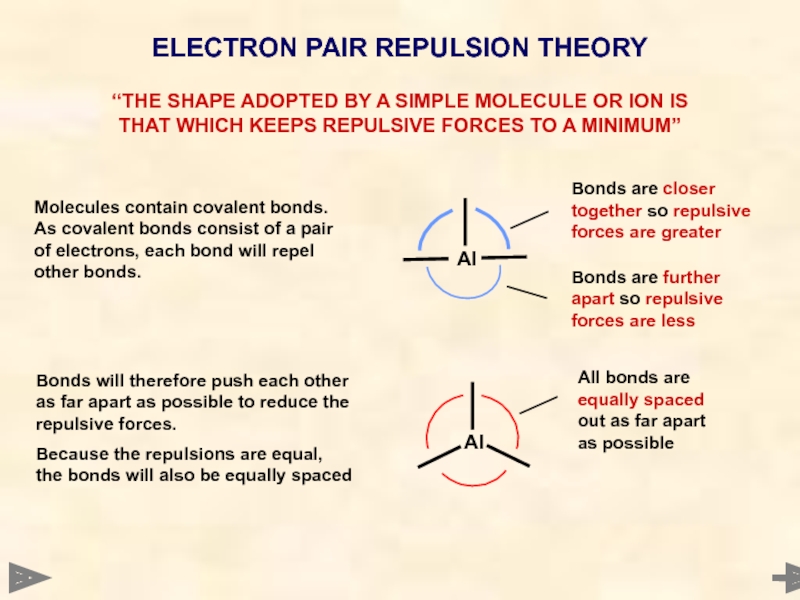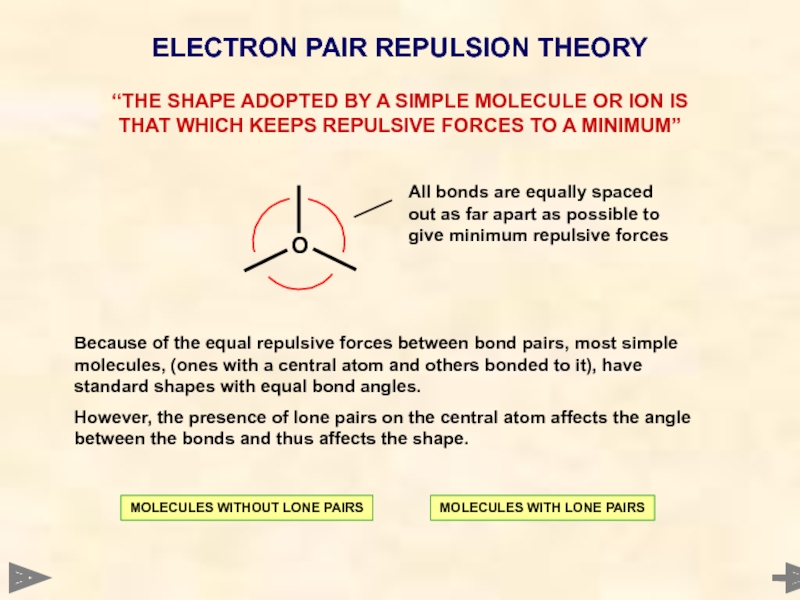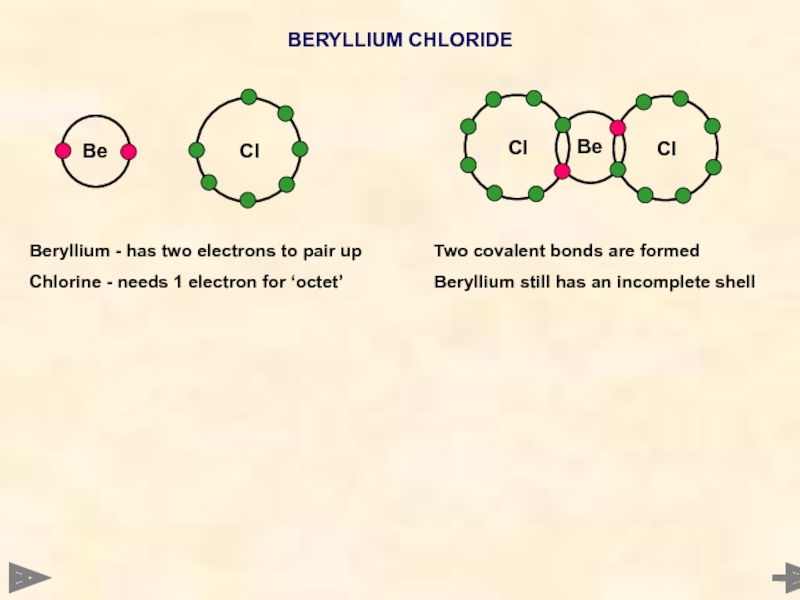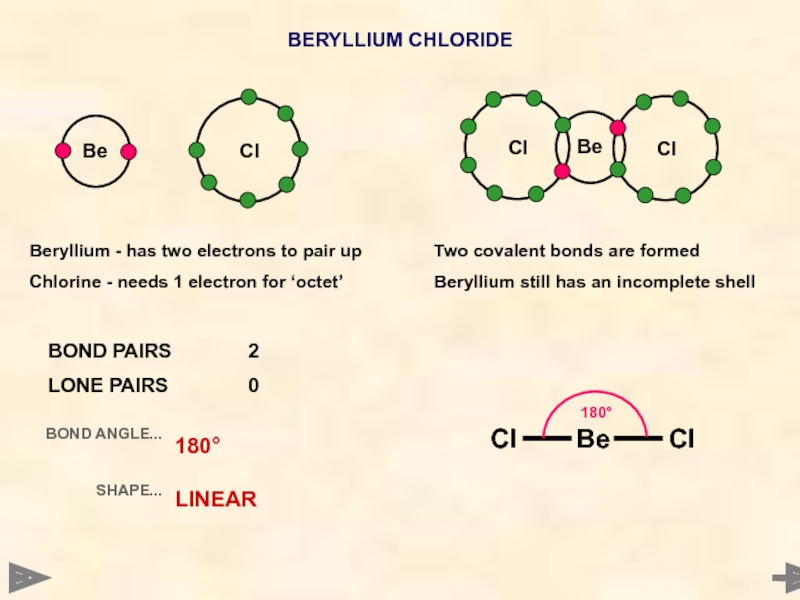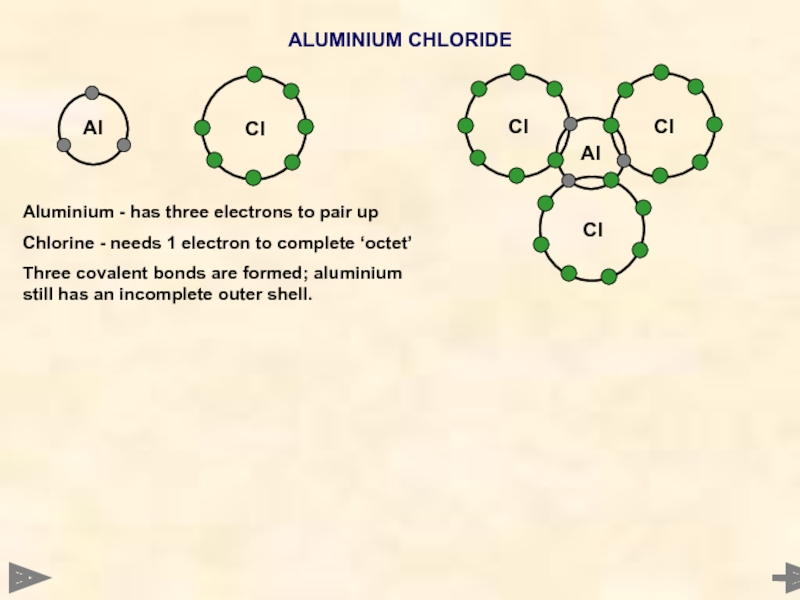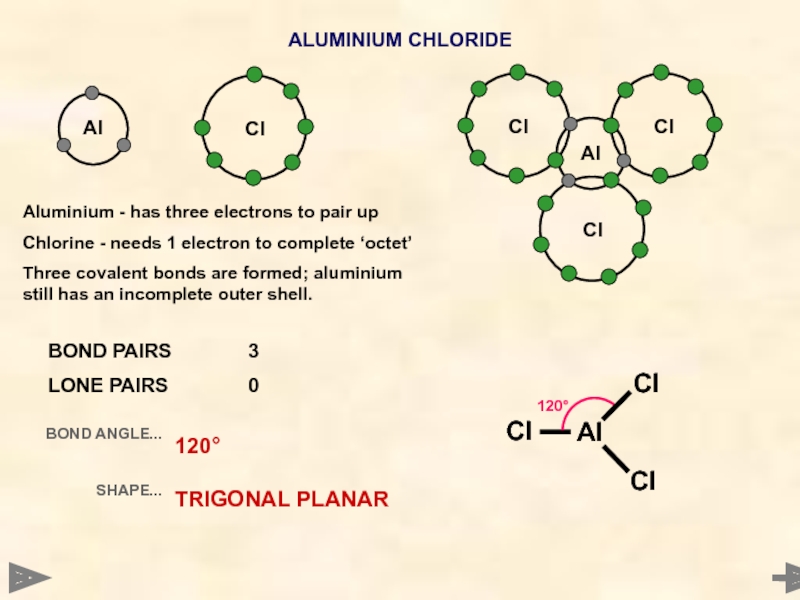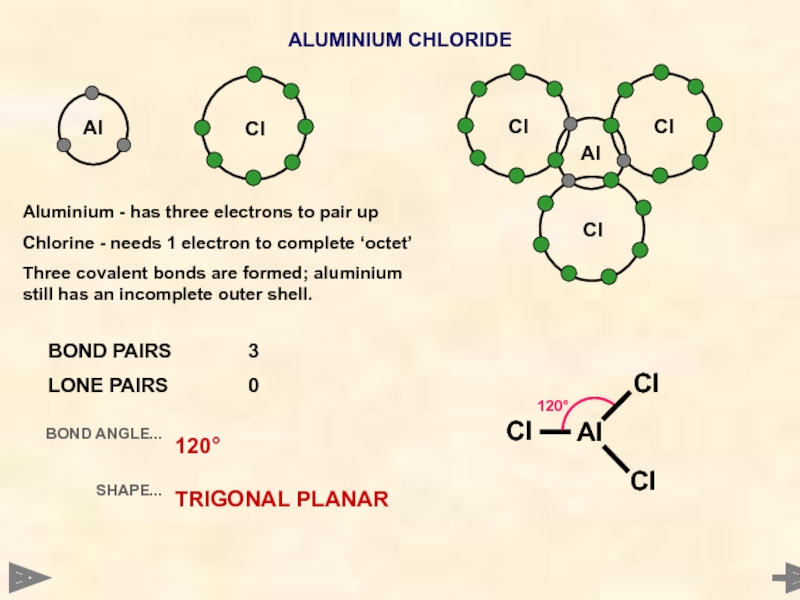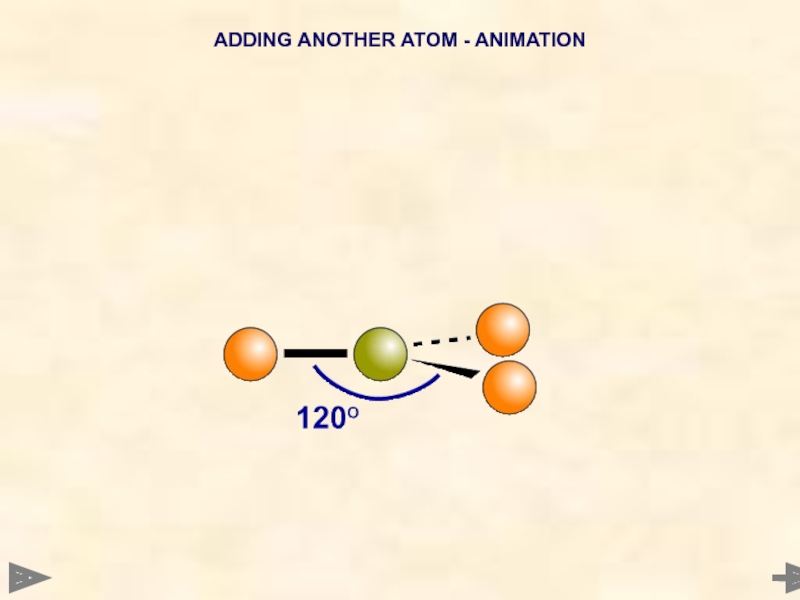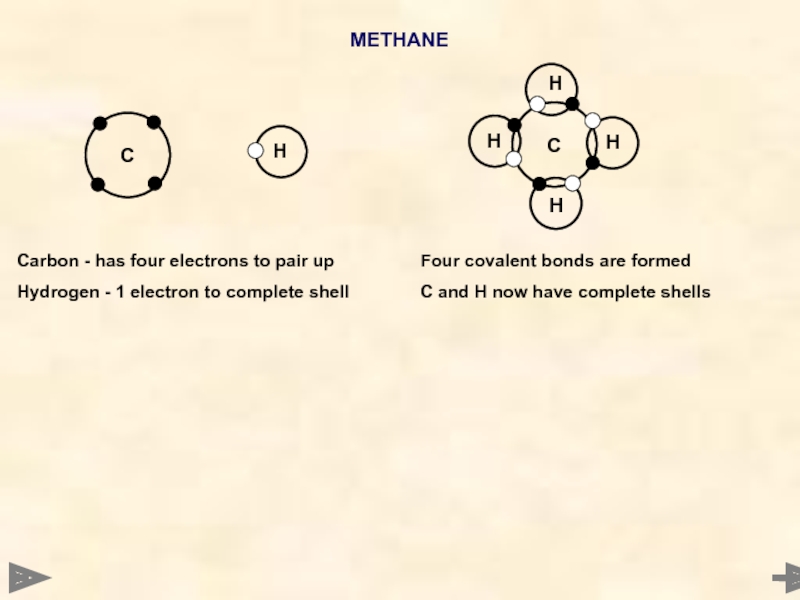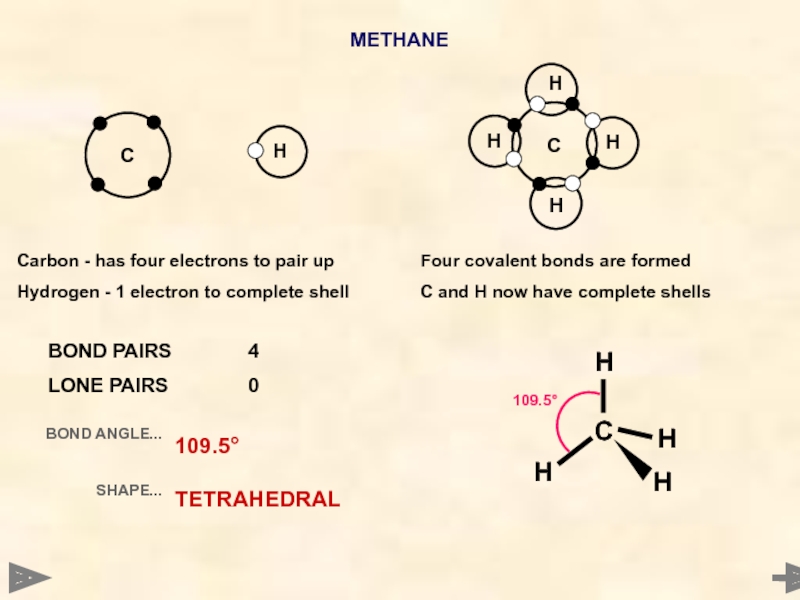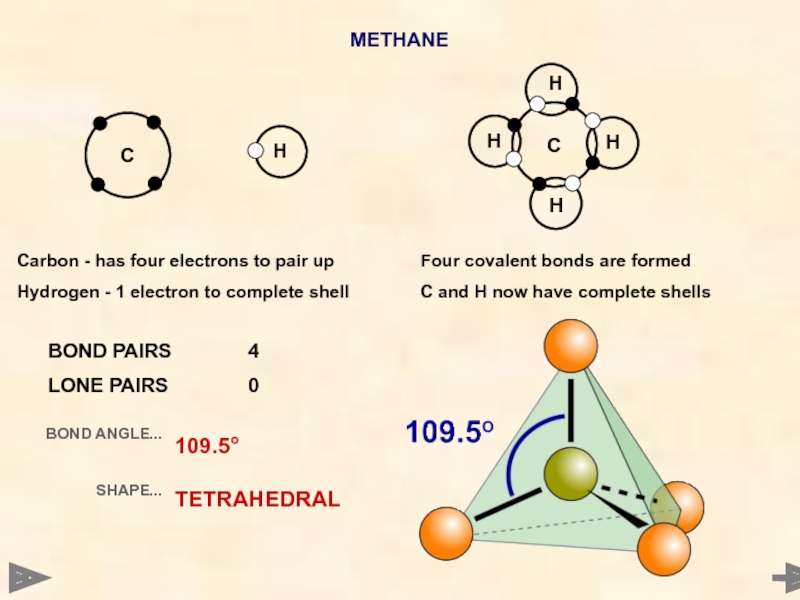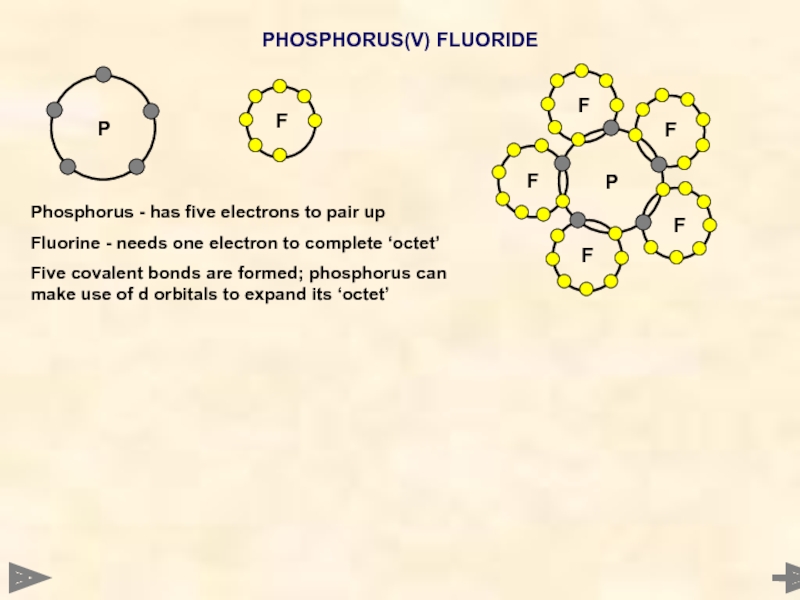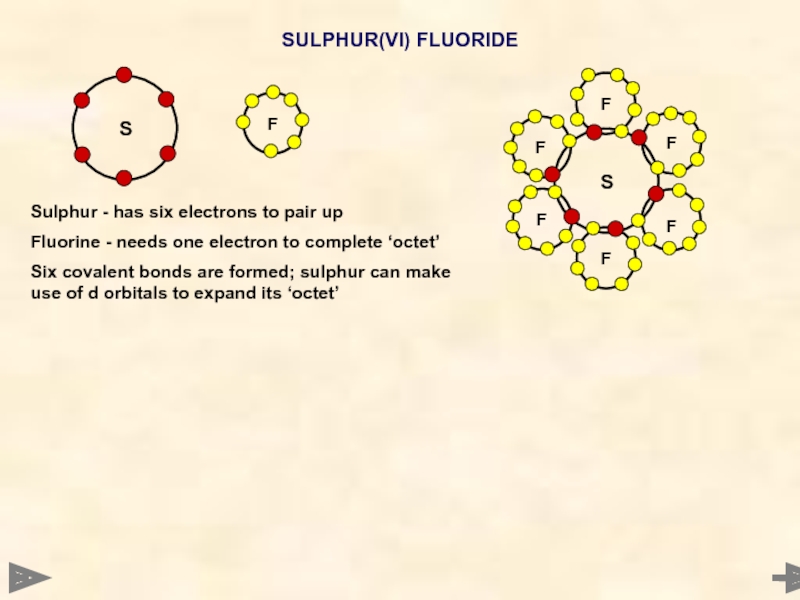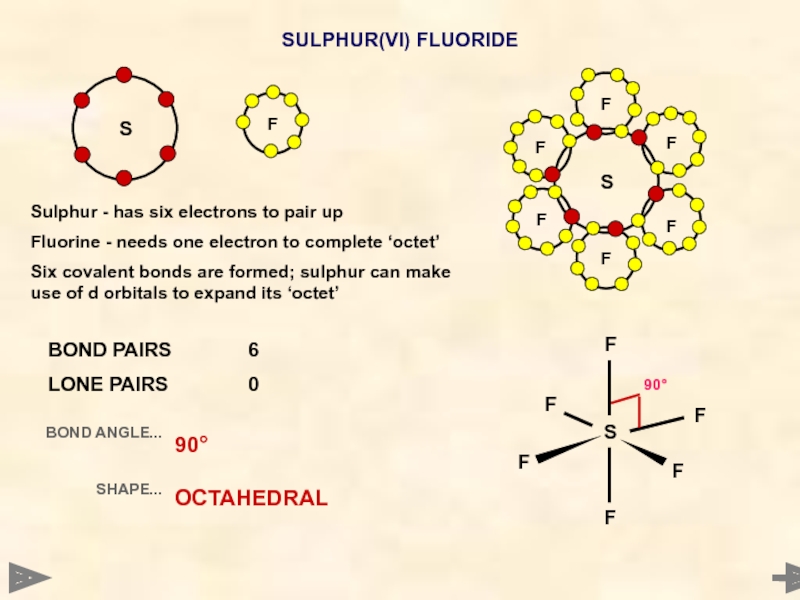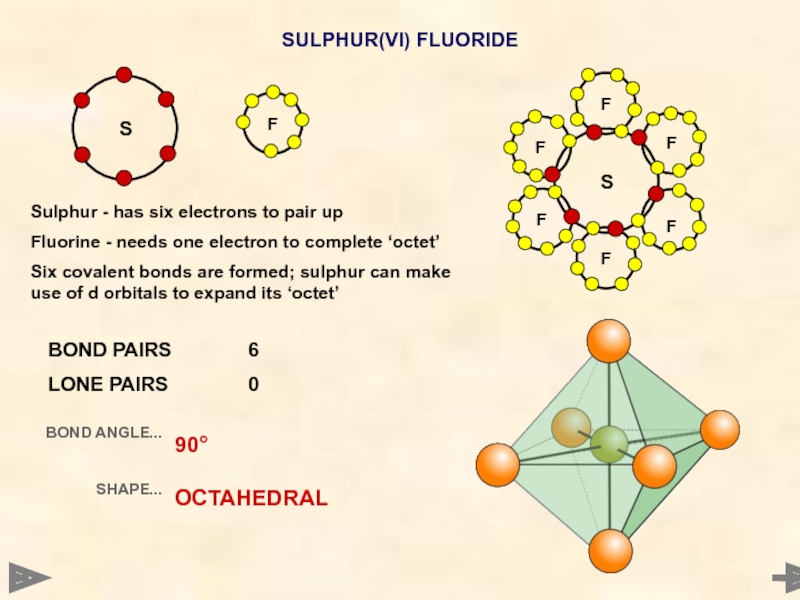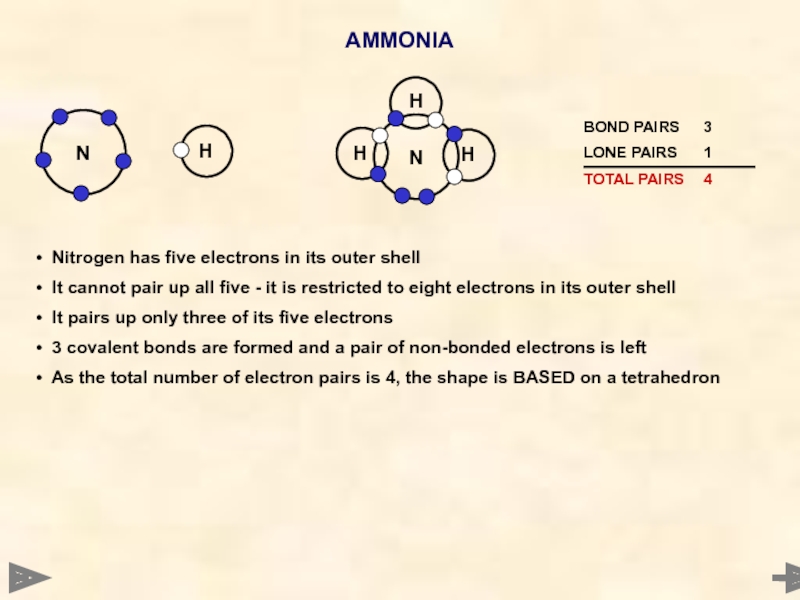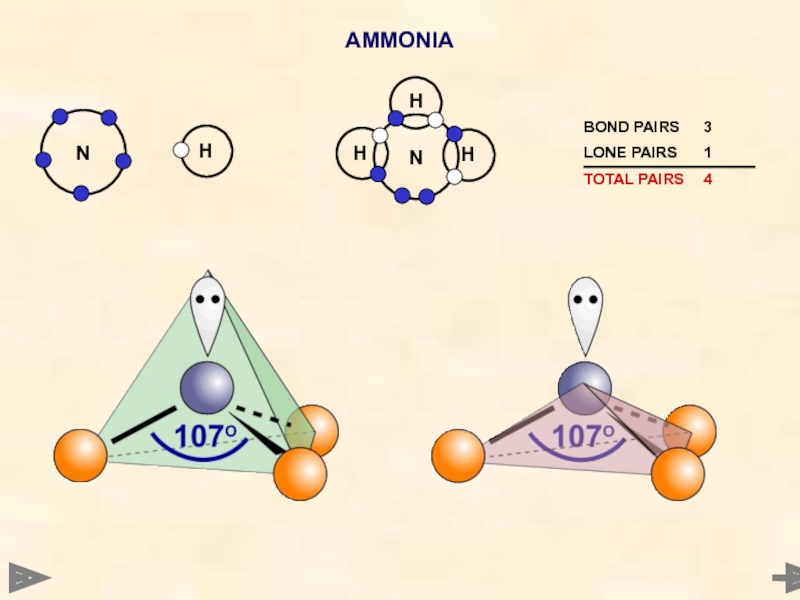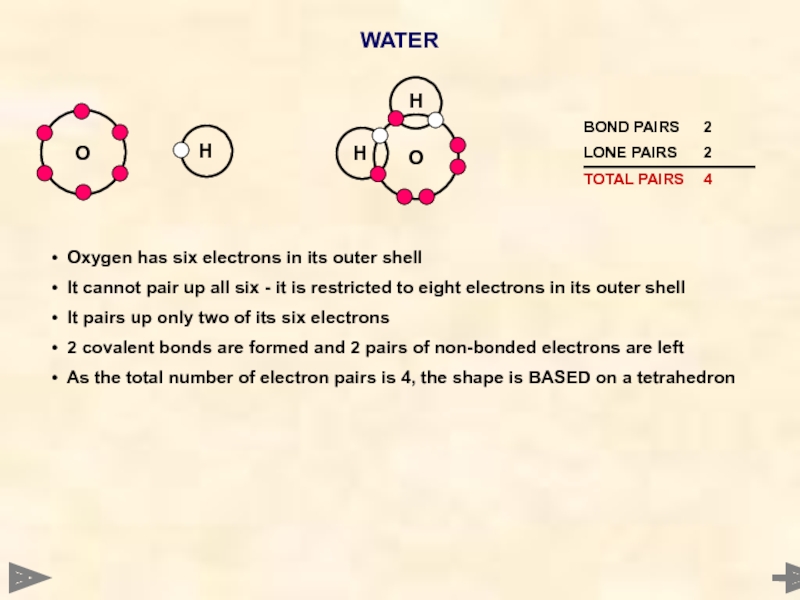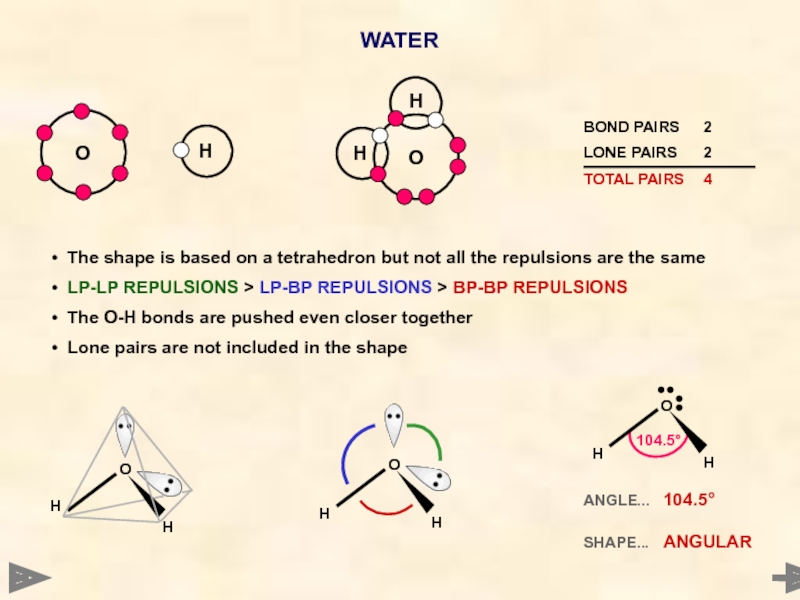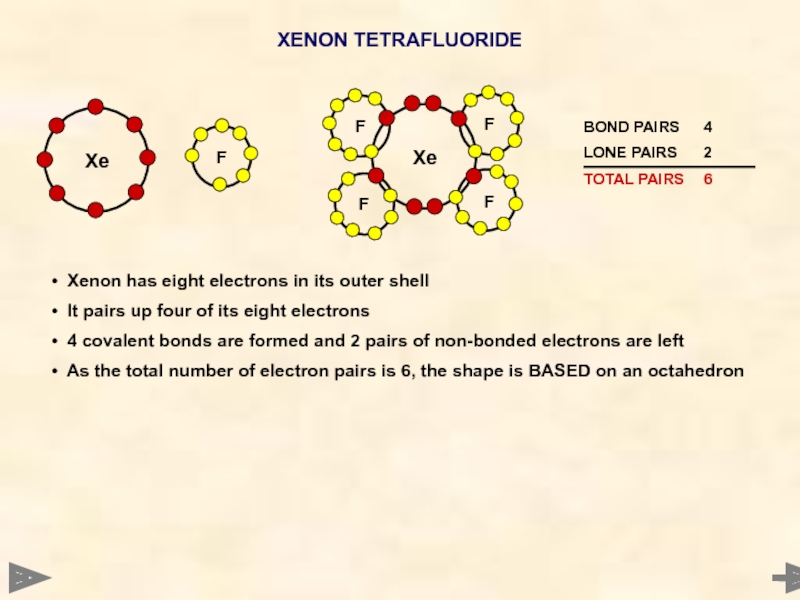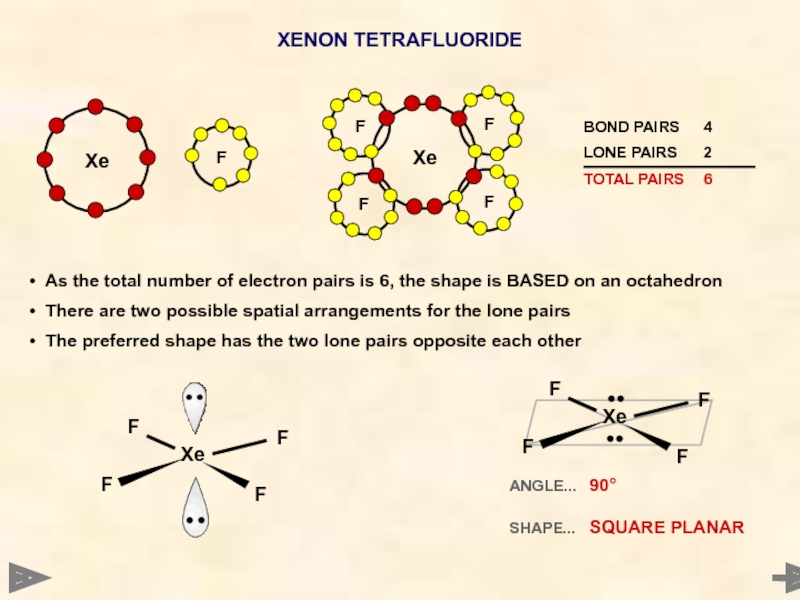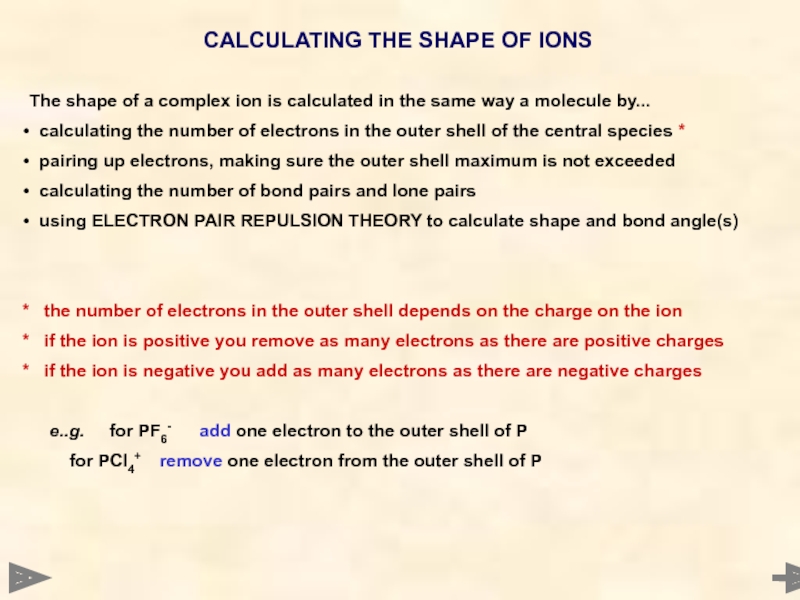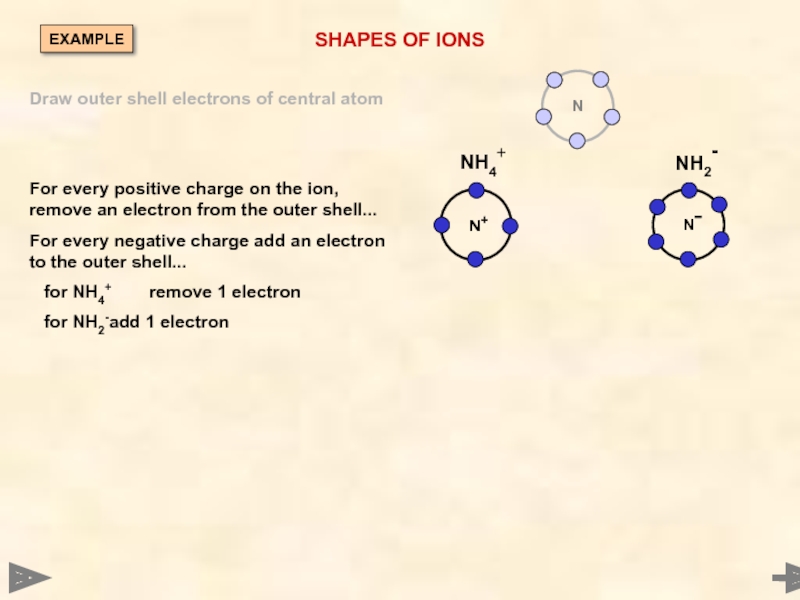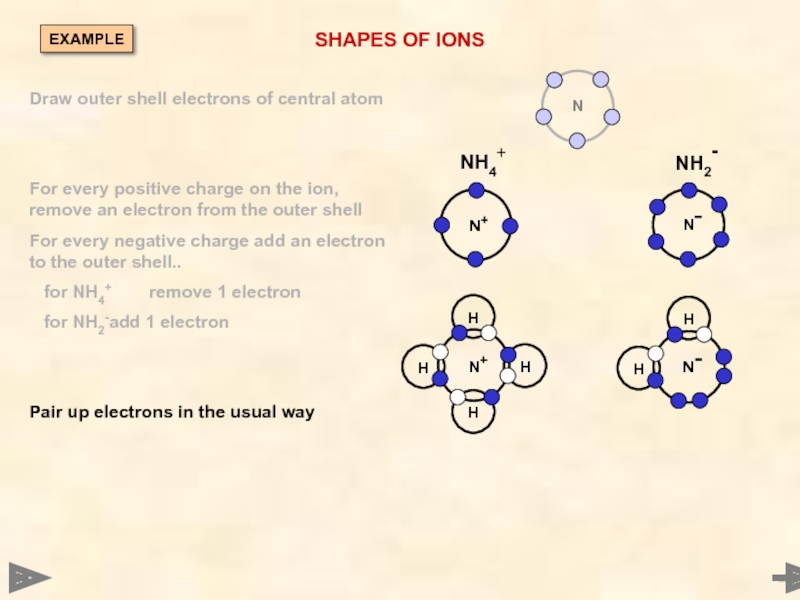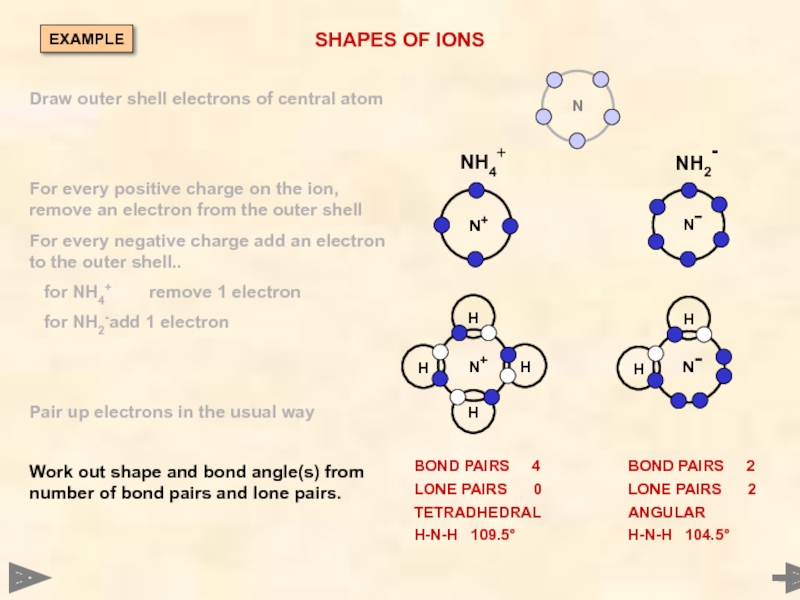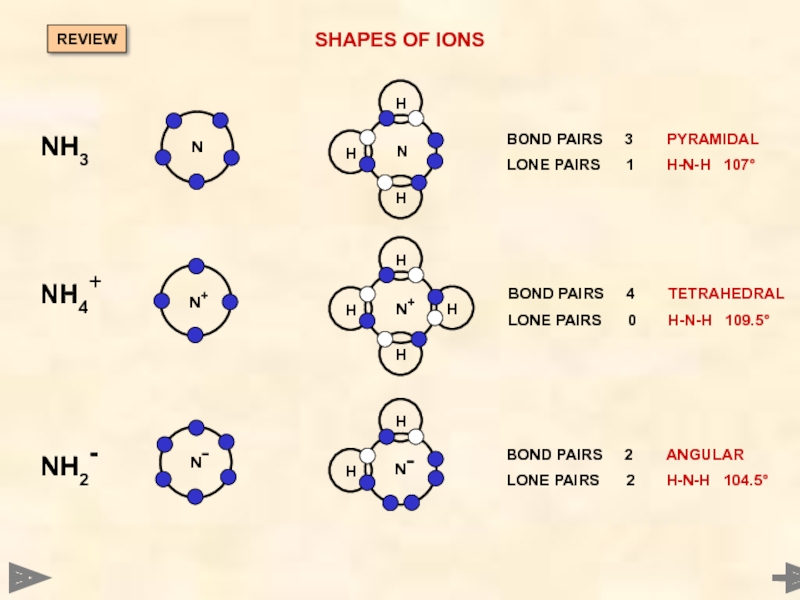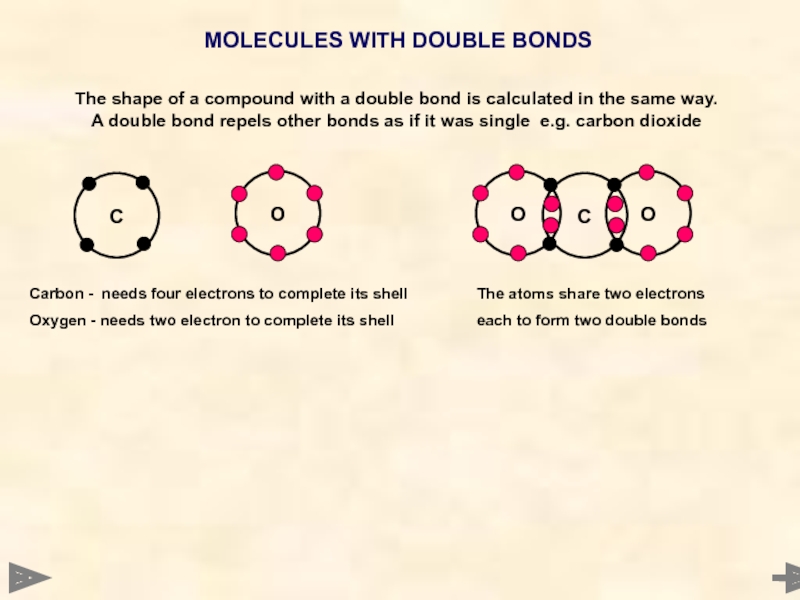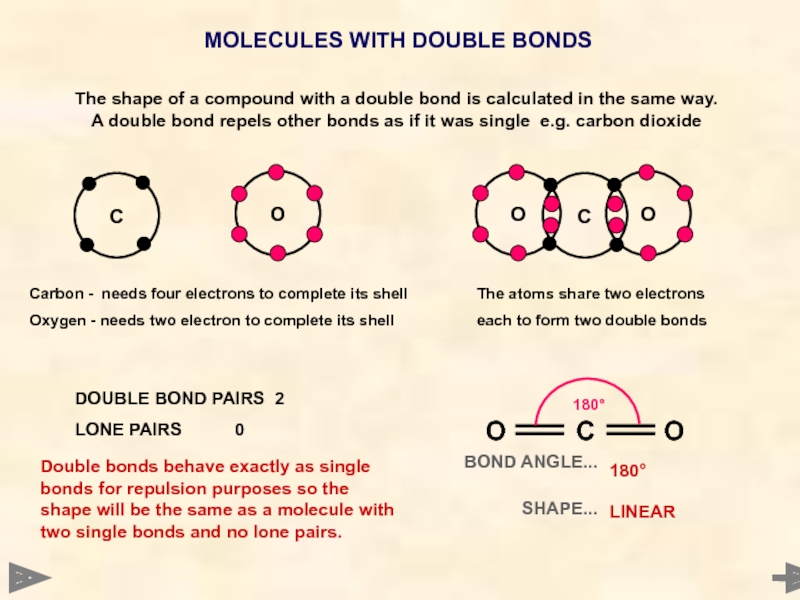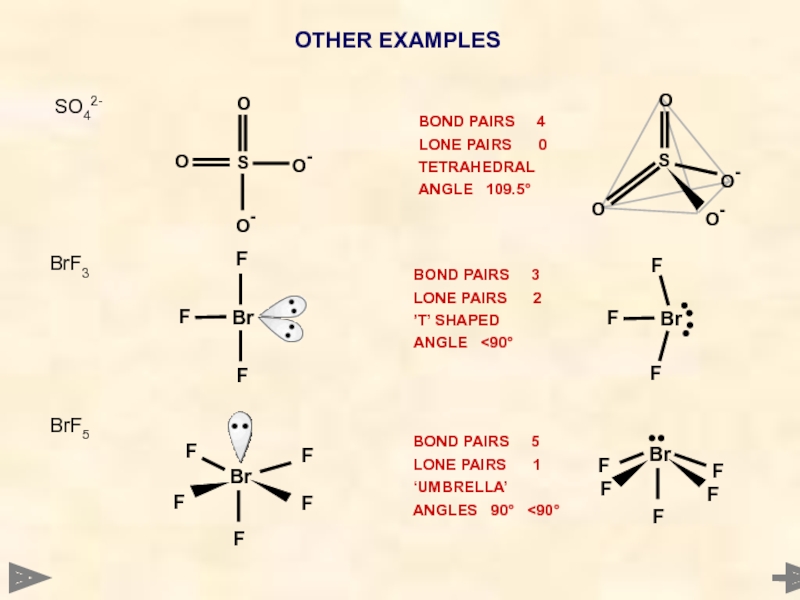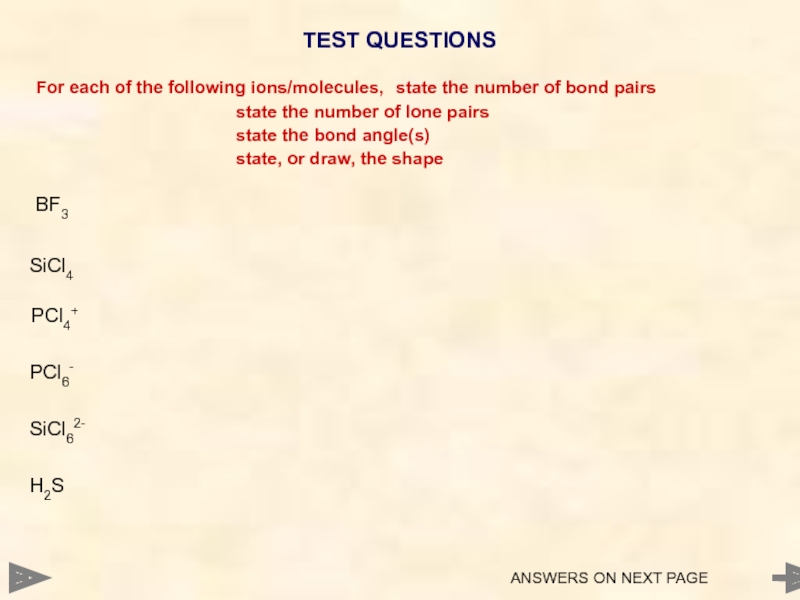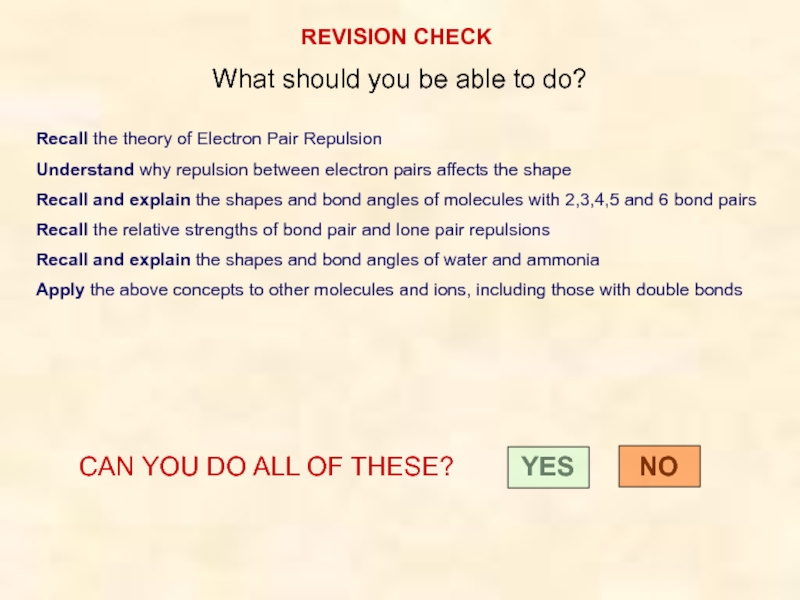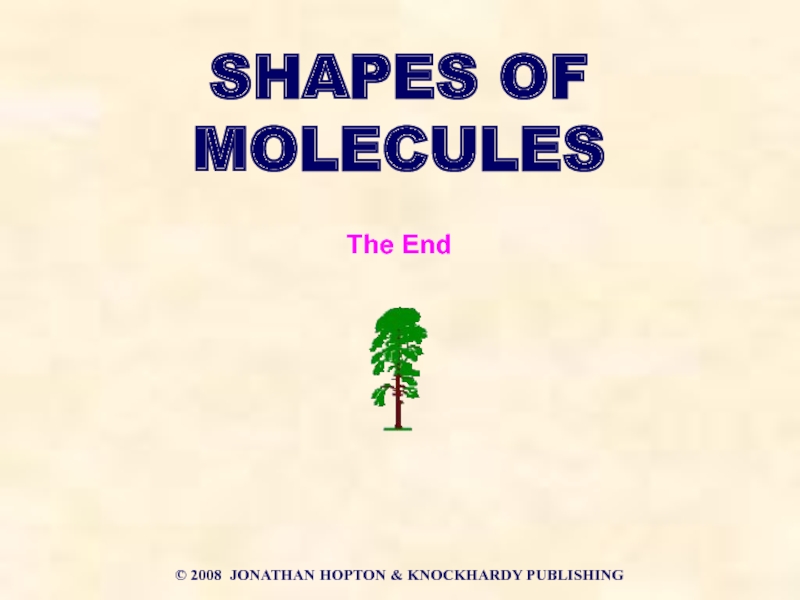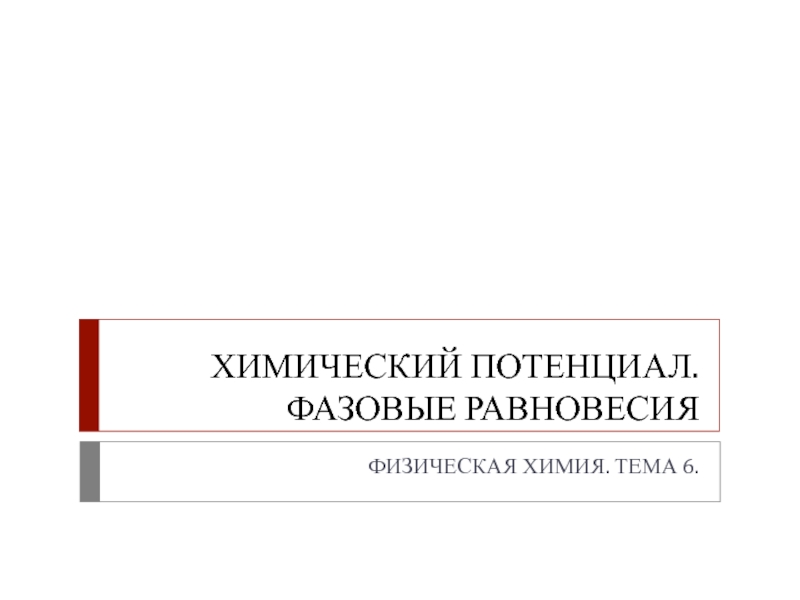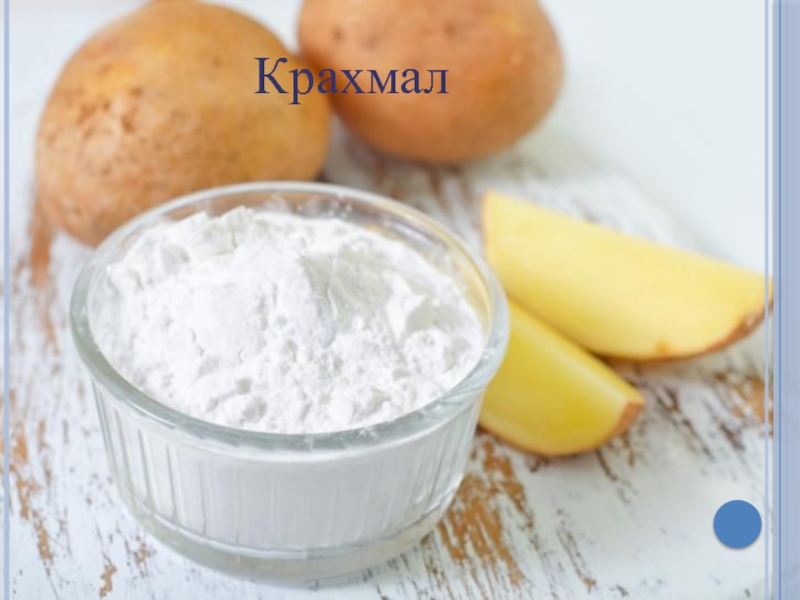- Главная
- Разное
- Дизайн
- Бизнес и предпринимательство
- Аналитика
- Образование
- Развлечения
- Красота и здоровье
- Финансы
- Государство
- Путешествия
- Спорт
- Недвижимость
- Армия
- Графика
- Культурология
- Еда и кулинария
- Лингвистика
- Английский язык
- Астрономия
- Алгебра
- Биология
- География
- Детские презентации
- Информатика
- История
- Литература
- Маркетинг
- Математика
- Медицина
- Менеджмент
- Музыка
- МХК
- Немецкий язык
- ОБЖ
- Обществознание
- Окружающий мир
- Педагогика
- Русский язык
- Технология
- Физика
- Философия
- Химия
- Шаблоны, картинки для презентаций
- Экология
- Экономика
- Юриспруденция
Shapes of molecules презентация
Содержание
- 1. Shapes of molecules
- 2. INTRODUCTION This Powerpoint show is one of
- 3. CONTENTS
- 4. Before you start it would be helpful
- 5. ELECTRON PAIR REPULSION THEORY “THE
- 6. ELECTRON PAIR REPULSION THEORY “THE
- 7. REGULAR SHAPES Molecules, or ions,
- 8. BERYLLIUM CHLORIDE Beryllium - has
- 9. BERYLLIUM CHLORIDE BOND PAIRS 2 LONE
- 10. ADDING ANOTHER ATOM - ANIMATION
- 11. Al ALUMINIUM
- 12. Al ALUMINIUM
- 13. Al ALUMINIUM
- 14. ADDING ANOTHER ATOM - ANIMATION
- 15. METHANE Carbon - has
- 16. METHANE BOND PAIRS 4 LONE PAIRS 0
- 17. METHANE BOND PAIRS 4 LONE PAIRS 0
- 18. PHOSPHORUS(V) FLUORIDE P
- 19. PHOSPHORUS(V) FLUORIDE P
- 20. SULPHUR(VI) FLUORIDE Sulphur - has
- 21. SULPHUR(VI) FLUORIDE BOND PAIRS 6 LONE
- 22. SULPHUR(VI) FLUORIDE BOND PAIRS 6 LONE
- 23. IRREGULAR SHAPES If a molecule,
- 24. AMMONIA Nitrogen has five
- 25. AMMONIA ANGLE... 107° SHAPE... PYRAMIDAL
- 26. AMMONIA
- 27. WATER Oxygen has six
- 28. ANGLE... 104.5° SHAPE... ANGULAR H
- 29. XENON TETRAFLUORIDE Xenon has
- 30. XENON TETRAFLUORIDE F F F
- 31. CALCULATING THE SHAPE OF IONS
- 32. SHAPES OF IONS Draw outer shell electrons of central atom EXAMPLE
- 33. SHAPES OF IONS NH4+ NH2-
- 34. SHAPES OF IONS NH4+ NH2-
- 35. SHAPES OF IONS NH4+ NH2-
- 36. SHAPES OF IONS BOND PAIRS
- 37. MOLECULES WITH DOUBLE BONDS
- 38. MOLECULES WITH DOUBLE BONDS
- 39. OTHER EXAMPLES BrF5 BOND PAIRS
- 40. ANSWERS ON NEXT PAGE
- 41. TEST QUESTIONS 3 bp 0 lp 120º trigonal
- 42. REVISION CHECK What should you be able
- 43. You need to go over the relevant
- 44. WELL DONE! Try some past paper questions
- 45. © 2008 JONATHAN HOPTON & KNOCKHARDY PUBLISHING SHAPES OF MOLECULES The End
Слайд 2INTRODUCTION
This Powerpoint show is one of several produced to help students
Individual students may use the material at home for revision purposes or it may be used for classroom teaching if an interactive white board is available.
Accompanying notes on this, and the full range of AS and A2 topics, are available from the KNOCKHARDY SCIENCE WEBSITE at...
www.knockhardy.org.uk/sci.htm
Navigation is achieved by...
either clicking on the grey arrows at the foot of each page
or using the left and right arrow keys on the keyboard
SHAPES OF MOLECULES
KNOCKHARDY PUBLISHING
Слайд 3 CONTENTS
Prior knowledge
Electron pair
The regular molecular shapes
Shapes of molecules with lone pairs
Shapes of ions
Molecules with double bonds
Other examples
Test questions
Check list
SHAPES OF MOLECULES
Слайд 4Before you start it would be helpful to…
know the definition
know what a lone pair is
know that like charges repel
SHAPES OF MOLECULES
Слайд 5ELECTRON PAIR REPULSION THEORY
“THE SHAPE ADOPTED BY A SIMPLE MOLECULE OR
Molecules contain covalent bonds. As covalent bonds consist of a pair of electrons, each bond will repel other bonds.
Bonds are further apart so repulsive forces are less
Bonds are closer together so repulsive forces are greater
All bonds are equally spaced out as far apart as possible
Bonds will therefore push each other as far apart as possible to reduce the repulsive forces.
Because the repulsions are equal, the bonds will also be equally spaced
Слайд 6ELECTRON PAIR REPULSION THEORY
“THE SHAPE ADOPTED BY A SIMPLE MOLECULE OR
MOLECULES WITHOUT LONE PAIRS
MOLECULES WITH LONE PAIRS
Because of the equal repulsive forces between bond pairs, most simple molecules, (ones with a central atom and others bonded to it), have standard shapes with equal bond angles.
However, the presence of lone pairs on the central atom affects the angle between the bonds and thus affects the shape.
All bonds are equally spaced out as far apart as possible to give minimum repulsive forces
Слайд 7
REGULAR SHAPES
Molecules, or ions, possessing ONLY BOND PAIRS of electrons fit
All you need to do is to count up the number of bond pairs and chose one of the following examples...
2 LINEAR 180º BeCl2
3 TRIGONAL PLANAR 120º AlCl3
4 TETRAHEDRAL 109.5º CH4
5 TRIGONAL BIPYRAMIDAL 90º & 120º PCl5
6 OCTAHEDRAL 90º SF6
BOND BOND
PAIRS SHAPE ANGLE(S) EXAMPLE
A covalent bond will repel another covalent bond
Слайд 8
BERYLLIUM CHLORIDE
Beryllium - has two electrons to pair up
Chlorine - needs
Two covalent bonds are formed
Beryllium still has an incomplete shell
Слайд 9
BERYLLIUM CHLORIDE
BOND PAIRS 2
LONE PAIRS 0
BOND ANGLE...
SHAPE...
180°
LINEAR
Beryllium - has two electrons to pair
Chlorine - needs 1 electron for ‘octet’
Two covalent bonds are formed
Beryllium still has an incomplete shell
Слайд 11
Al
ALUMINIUM CHLORIDE
Aluminium - has three electrons to pair up
Chlorine - needs
Three covalent bonds are formed; aluminium still has an incomplete outer shell.
Слайд 12
Al
ALUMINIUM CHLORIDE
Cl
Cl
Al
120°
Cl
BOND PAIRS 3
LONE PAIRS 0
BOND ANGLE...
SHAPE...
120°
TRIGONAL PLANAR
Aluminium - has three electrons to
Chlorine - needs 1 electron to complete ‘octet’
Three covalent bonds are formed; aluminium still has an incomplete outer shell.
Слайд 13
Al
ALUMINIUM CHLORIDE
Cl
Cl
Al
120°
Cl
BOND PAIRS 3
LONE PAIRS 0
BOND ANGLE...
SHAPE...
120°
TRIGONAL PLANAR
Aluminium - has three electrons to
Chlorine - needs 1 electron to complete ‘octet’
Three covalent bonds are formed; aluminium still has an incomplete outer shell.
Слайд 15
METHANE
Carbon - has four electrons to pair up
Hydrogen - 1 electron
Four covalent bonds are formed
C and H now have complete shells
Слайд 16
METHANE
BOND PAIRS 4
LONE PAIRS 0
BOND ANGLE...
SHAPE...
109.5°
TETRAHEDRAL
Carbon - has four electrons to pair up
Hydrogen
Four covalent bonds are formed
C and H now have complete shells
Слайд 17
METHANE
BOND PAIRS 4
LONE PAIRS 0
BOND ANGLE...
SHAPE...
109.5°
TETRAHEDRAL
Carbon - has four electrons to pair up
Hydrogen
Four covalent bonds are formed
C and H now have complete shells
Слайд 18
PHOSPHORUS(V) FLUORIDE
P
Phosphorus - has five electrons to pair up
Fluorine - needs
Five covalent bonds are formed; phosphorus can make use of d orbitals to expand its ‘octet’
Слайд 19
PHOSPHORUS(V) FLUORIDE
P
BOND PAIRS 5
LONE PAIRS 0
BOND ANGLE...
SHAPE...
120° & 90°
TRIGONAL BIPYRAMIDAL
Phosphorus - has
Fluorine - needs one electron to complete ‘octet’
Five covalent bonds are formed; phosphorus can make use of d orbitals to expand its ‘octet’
Слайд 20
SULPHUR(VI) FLUORIDE
Sulphur - has six electrons to pair up
Fluorine - needs
Six covalent bonds are formed; sulphur can make use of d orbitals to expand its ‘octet’
Слайд 21
SULPHUR(VI) FLUORIDE
BOND PAIRS 6
LONE PAIRS 0
BOND ANGLE...
SHAPE...
90°
OCTAHEDRAL
Sulphur - has six electrons to
Fluorine - needs one electron to complete ‘octet’
Six covalent bonds are formed; sulphur can make use of d orbitals to expand its ‘octet’
90°
Слайд 22
SULPHUR(VI) FLUORIDE
BOND PAIRS 6
LONE PAIRS 0
BOND ANGLE...
SHAPE...
90°
OCTAHEDRAL
Sulphur - has six electrons to
Fluorine - needs one electron to complete ‘octet’
Six covalent bonds are formed; sulphur can make use of d orbitals to expand its ‘octet’
Слайд 23IRREGULAR SHAPES
If a molecule, or ion, has lone pairs on the
BOND PAIR - BOND PAIR < LONE PAIR - BOND PAIR < LONE PAIR - LONE PAIR
As a result of the extra repulsion, bond angles tend to be slightly less as the bonds are squeezed together.
Слайд 24
AMMONIA
Nitrogen has five electrons in its outer shell
It cannot
It pairs up only three of its five electrons
3 covalent bonds are formed and a pair of non-bonded electrons is left
As the total number of electron pairs is 4, the shape is BASED on a tetrahedron
Слайд 25
AMMONIA
ANGLE... 107°
SHAPE... PYRAMIDAL
H
H
N
H
The shape is based on a tetrahedron but
LP-BP REPULSIONS > BP-BP REPULSIONS
The N-H bonds are pushed closer together
Lone pairs are not included in the shape
Слайд 27
WATER
Oxygen has six electrons in its outer shell
It cannot
It pairs up only two of its six electrons
2 covalent bonds are formed and 2 pairs of non-bonded electrons are left
As the total number of electron pairs is 4, the shape is BASED on a tetrahedron
Слайд 28ANGLE... 104.5°
SHAPE... ANGULAR
H
O
H
H
O
H
104.5°
H
O
H
The shape is based on a tetrahedron but
LP-LP REPULSIONS > LP-BP REPULSIONS > BP-BP REPULSIONS
The O-H bonds are pushed even closer together
Lone pairs are not included in the shape
WATER
Слайд 29
XENON TETRAFLUORIDE
Xenon has eight electrons in its outer shell
It
4 covalent bonds are formed and 2 pairs of non-bonded electrons are left
As the total number of electron pairs is 6, the shape is BASED on an octahedron
Слайд 30
XENON TETRAFLUORIDE
F
F
F
F
Xe
ANGLE... 90°
SHAPE... SQUARE PLANAR
As the total number of electron
There are two possible spatial arrangements for the lone pairs
The preferred shape has the two lone pairs opposite each other
Слайд 31
CALCULATING THE SHAPE OF IONS
The shape of a complex ion is
calculating the number of electrons in the outer shell of the central species *
pairing up electrons, making sure the outer shell maximum is not exceeded
calculating the number of bond pairs and lone pairs
using ELECTRON PAIR REPULSION THEORY to calculate shape and bond angle(s)
the number of electrons in the outer shell depends on the charge on the ion
if the ion is positive you remove as many electrons as there are positive charges
if the ion is negative you add as many electrons as there are negative charges
e..g. for PF6- add one electron to the outer shell of P
for PCl4+ remove one electron from the outer shell of P
Слайд 33
SHAPES OF IONS
NH4+
NH2-
Draw outer shell electrons of central atom
For every positive
For every negative charge add an electron to the outer shell...
for NH4+ remove 1 electron
for NH2- add 1 electron
N
EXAMPLE
Слайд 34
SHAPES OF IONS
NH4+
NH2-
Draw outer shell electrons of central atom
For every positive
For every negative charge add an electron to the outer shell..
for NH4+ remove 1 electron
for NH2- add 1 electron
Pair up electrons in the usual way
EXAMPLE
N
Слайд 35
SHAPES OF IONS
NH4+
NH2-
BOND PAIRS 4
LONE PAIRS 0
TETRADHEDRAL
H-N-H
BOND PAIRS 2
LONE PAIRS 2
ANGULAR
H-N-H 104.5°
Draw outer shell electrons of central atom
For every positive charge on the ion, remove an electron from the outer shell
For every negative charge add an electron to the outer shell..
for NH4+ remove 1 electron
for NH2- add 1 electron
Pair up electrons in the usual way
Work out shape and bond angle(s) from number of bond pairs and lone pairs.
EXAMPLE
N
Слайд 36
SHAPES OF IONS
BOND PAIRS 3 PYRAMIDAL
LONE PAIRS 1 H-N-H
BOND PAIRS 4 TETRAHEDRAL
LONE PAIRS 0 H-N-H 109.5°
BOND PAIRS 2 ANGULAR
LONE PAIRS 2 H-N-H 104.5°
NH4+
NH2-
NH3
REVIEW
Слайд 37
MOLECULES WITH DOUBLE BONDS
C
O
O
Carbon - needs four electrons to complete its
Oxygen - needs two electron to complete its shell
The atoms share two electrons
each to form two double bonds
The shape of a compound with a double bond is calculated in the same way. A double bond repels other bonds as if it was single e.g. carbon dioxide
Слайд 38
MOLECULES WITH DOUBLE BONDS
C
O
O
Carbon - needs four electrons to complete its
Oxygen - needs two electron to complete its shell
The atoms share two electrons
each to form two double bonds
DOUBLE BOND PAIRS 2
LONE PAIRS 0
Double bonds behave exactly as single bonds for repulsion purposes so the shape will be the same as a molecule with two single bonds and no lone pairs.
The shape of a compound with a double bond is calculated in the same way. A double bond repels other bonds as if it was single e.g. carbon dioxide
Слайд 40
ANSWERS ON NEXT PAGE
TEST QUESTIONS
For each of the following ions/molecules, state
state the number of lone pairs
state the bond angle(s)
state, or draw, the shape
SiCl4
PCl6-
H2S
SiCl62-
PCl4+
BF3
Слайд 41TEST QUESTIONS
3 bp 0 lp 120º trigonal planar boron pairs up all 3 electrons in
its
4 bp 0 lp 109.5º tetrahedral silicon pairs up all 4 electrons in
its outer shell
4 bp 0 lp 109.5º tetrahedral as ion is +, remove an electron
in the outer shell then pair up
6 bp 0 lp 90º octahedral as the ion is - , add one electron to
the 5 in the outer shell then pair up
6 bp 0 lp 90º octahedral as the ion is 2-, add two electrons
to the outer shell then pair up
2 bp 2 lp 92º angular sulphur pairs up 2 of its 6 electrons in its outer shell -
2 lone pairs are left
BF3
SiCl4
PCl6-
H2S
SiCl62-
PCl4+
ANSWER
For each of the following ions/molecules, state the number of bond pairs
state the number of lone pairs
state the bond angle(s)
state, or draw, the shape
Слайд 42REVISION CHECK
What should you be able to do?
Recall the theory of
Understand why repulsion between electron pairs affects the shape
Recall and explain the shapes and bond angles of molecules with 2,3,4,5 and 6 bond pairs
Recall the relative strengths of bond pair and lone pair repulsions
Recall and explain the shapes and bond angles of water and ammonia
Apply the above concepts to other molecules and ions, including those with double bonds
CAN YOU DO ALL OF THESE? YES NO
